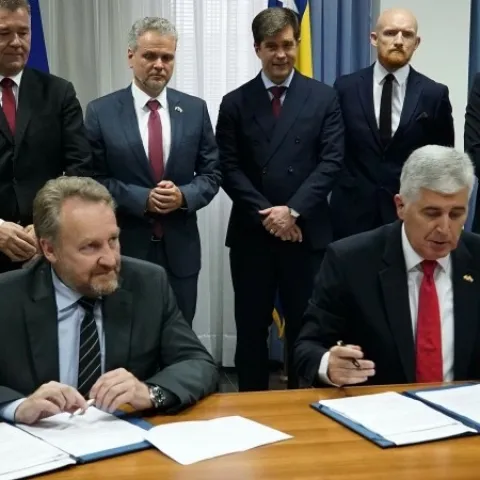

Christian Schmidt
Will the international community in BiH support Bosniak hegemony or the rule of law?
There are currently two types of discrimination in the election process in BiH: the first is recognized in the set of decisions of the European Court of Human Rights and refers to the inability of all BiH citizens to run for office, while the second type of discrimination is detected in the Ljubić Decision of the BiH Constitutional Court (U 23-14) and refers to the adequate representation of all three constituent peoples in government bodies.
For years, Bosniak politics has been instrumentalizing ECtHR decisions by trying to use them as an overture to abolish the constituency of peoples, which is the supreme principle of the BiH Constitution. The obstacle to these hegemonic aspirations is precisely the Ljubić Decision, which cannot be bypassed.
In the negotiations, the Croat parties created about 10 proposals, while the Bosniak parties offered only one proposal at the end of the negotiations. High-ranking SDA member Alma Čolo said it was logical because the changes to the Election Law were "their (Croats') demands".
Thus, the strongest Bosniak party, the SDA, reduces the rule of law and a concrete decision of the BiH Constitutional Court to the „demands“ of certain political actors, as if consistent implementation of all relevant court decisions is not the responsibility of all political actors, including the SDA.
The last attempt to save the democratic imperative of non-discrimination in the election process was made by Croat envoys in the House of Peoples of the BiH Parliamentary Assembly when they proposed amendments to the Election Law on April 22, 2022. Bosniak envoys initially blocked the session and then used a veto mechanism, claiming that the proposal violates the vital national interest of the Bosniak people.
A short note - this was the 14th time (!) that Bosniak envoys used the veto mechanism, while Croat envoys did it only twice.
As expected, the BiH Constitutional Court in the case no. U 14-22 ruled that the Croat proposal to amend the Election Law and the so-called 16 + 1 model for filling the House of Peoples of the Parliament of the BiH Federation are not discriminatory and do not violate the vital national interest of the Bosniak people. All three foreign judges in the BiH Constitutional Court agreed with this assessment.
Although Croat proposals are often maliciously presented to the Bosniak public as anti-democratic, anti-European and "apartheid", the BiH Constitutional Court has made it clear that this is not true. On the contrary, the BiH Constitutional Court legitimized the Croat proposal because it verified it as non-discriminatory.
Even this decision of the relevant court was not enough for Bosniak envoys not to try again to block the reform of the Election Law that would eliminate all forms of discrimination in the election process. This is sufficient evidence of the true attitude of the Bosniak political bloc towards the BiH institutions, but also towards the rule of law in general. However, after all the obstructions, the House of Peoples finally adopted Croats' proposal to amend the Election Law.
Unfortunately, Bosniak representatives will most likely block the implementation of the Constitutional Court's decision in the House of Representatives, which will be another glaring example of a violation of the Dayton Peace Agreement, ie Article VI / 5. of the BiH Constitution, according to which the decisions of the Constitutional Court are final and binding.
However, the Decision of the Constitutional Court in case no. U 14-22 prevents the manipulation that the Croat proposal is anti-democratic, so a clear statement of the international community should be sought on this Decision. Given that the Croat proposal has been confirmed as non-discriminatory and verified by the BiH Constitutional Court, the international community should support it.
The support of the international community for the verified proposal to amend the Election Law would facilitate its potential adoption in the House of Representatives, which would finally eliminate all forms of discrimination in the election process in BiH.
On the other hand, ignoring the verified proposal and conducting elections under the anti-Dayton and incomplete Election Law would result in further destabilization and far-reaching consequences for the entire country.
The international community should therefore show consistency, ie support the relevant BiH institutions and its decisions, all with the aim of truly respecting the rule of law and eliminating discrimination in the electoral process.
Dnevnik.ba